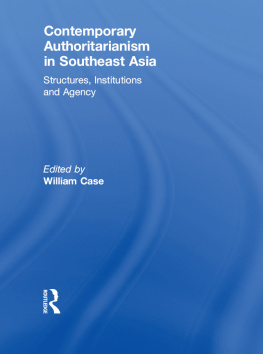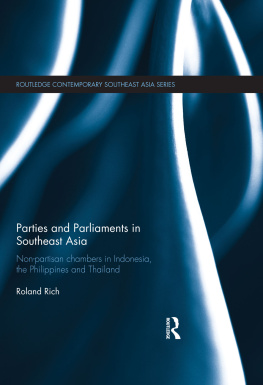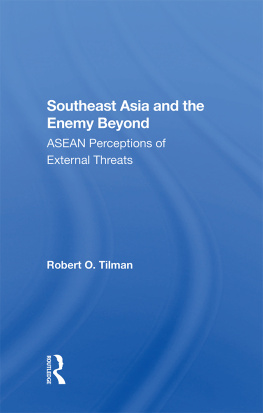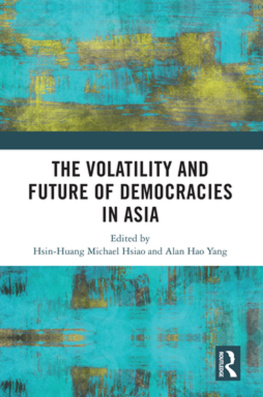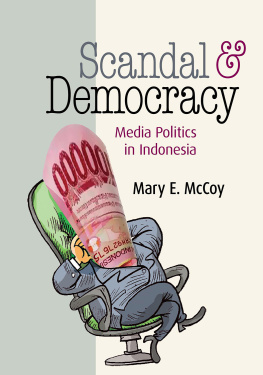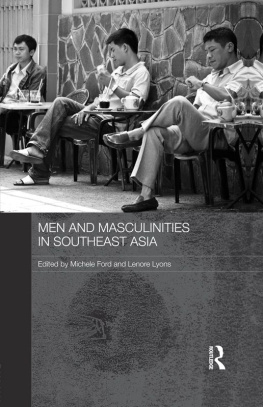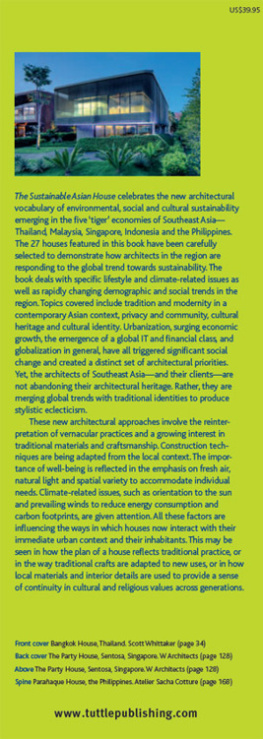
Populist Threats and Democracys Fate in Southeast Asia
Democracy in Southeast Asia has been explained using a number of factors including historical legacies, social structures, developmental levels, transitional processes, and institutional designs while other elements, such as elite-level relations and social coalitions, have been overlooked.
This book offers a new explanation for democracys collapse or persistence in Southeast Asia today. Focusing on Thailand, the Philippines and Indonesia the three countries in the region with the most democratic experience William Case shows that existing accounts based on contextual factors are by themselves incomplete. Hence, they lead us wrongly to anticipate democracys persistence in Thailand and its collapse in Indonesia. They more accurately, though only partially, correlate with democracys fluctuations in the Philippines. Advancing a new argument, Case shows that democracys fate is determined instead by the opportunities that contextual factors can provide for populist mobilization. His model enables us better to understand democracys breakdown in Thailand, its survival in Indonesia, and its slippage in the Philippines.
Presenting research into vital questions over democratic durability and authoritarian backlash, this book will be of interest to scholars in the field of comparative politics, specifically comparative democratization and Southeast Asian politics.
William Case is Professor in the Department of Asian and International Studies, City University of Hong Kong. His research interests are populism and political regimes in Southeast Asia, electoralism and the single-party dominance in Malaysia. His latest publication is the Routledge Handbook of Southeast Asian Democratization (2015) (ed.).
Routledge Contemporary Asia Series
51. East Asian Development Model
Twenty-first century perspectives
Edited by Shiping Hua and Ruihua Hu
52. Land Grabs in Asia
What role for the law?
Edited by Connie Carter and Andrew Harding
53. Asia Struggles with Democracy
Evidence from Indonesia, Korea and Thailand
Giovanna Maria Dora Dore
54. China-Malaysia Relations and Foreign Policy
Razak Abdullah
55. Politics of the Other in India and China
Western concepts in non-Western contexts
Edited by Lion Knig and Bidisha Chaudhuri
56. ChinaIndia Relations
Cooperation and conflict
Edited by Kanti Bajpai, Huang Jing and Kishore Mahbubani
57. New Regional Geopolitics in the Indo-Pacific
Drivers, dynamics and consequences
Edited by Priya Chacko
58. Energy Security in Asia and Eurasia
Edited by Mike M. Mochizuki and Deepa M. Ollapally
59. Populist Threats and Democracys Fate in Southeast Asia
Thailand, the Philippines, and Indonesia
William Case
First published 2017
by Routledge
2 Park Square, Milton Park, Abingdon, Oxon OX14 4RN
and by Routledge
711 Third Avenue, New York, NY 10017
Routledge is an imprint of the Taylor & Francis Group, an informa business
2017 William Case
The right of William Case to be identified as author of this work has been asserted by him/her in accordance with sections 77 and 78 of the Copyright, Designs and Patents Act 1988.
All rights reserved. No part of this book may be reprinted or reproduced or utilised in any form or by any electronic, mechanical, or other means, now known or hereafter invented, including photocopying and recording, or in any information storage or retrieval system, without permission in writing from the publishers.
Trademark notice: Product or corporate names may be trademarks or registered trademarks, and are used only for identification and explanation without intent to infringe.
British Library Cataloguing in Publication Data
A catalogue record for this book is available from the British Library
Library of Congress Cataloging in Publication Data
Names: Case, William, author.
Title: Populist threats and democracys fate in Southeast Asia : Thailand, the Philippines, and Indonesia / William Case.
Other titles: Routledge contemporary Asia series ; 59.
Description: Abingdon, Oxon ; New York : Routledge, 2017. |
Series: Routledge contemporary Asia series ; 59 | Includes bibliographical references and index.
Identifiers: LCCN 2016052260 | ISBN 9781138217218 (hardback) | ISBN 9781315188140 (ebook)
Subjects: LCSH: Southeast Asia--Politics and government. | Democracy--Southeast Asia. | Populism--Southeast Asia. | Civil society--Southeast Asia.
Classification: LCC JQ750.A91 C37 2017 | DDC 320.56/620959--dc23
LC record available at https://lccn.loc.gov/2016052260
ISBN: 978-1-138-21721-8 (hbk)
ISBN: 978-1-315-18814-0 (ebk)
The work described in this book was fully supported by a grant from the Research Grants Council of the Hong Kong Special Administrative Region, China (Project No. 9041939). The genesis of this research was a successful joint grant proposal written with Prof. Mark R. Thompson. While our research developed along different lines, I would like to acknowledge and thank Mark for our initial collaboration. I would also like to thank Ms Katy Holmes for her invaluable research assistance.
What explains democracys collapse or persistence in Southeast Asia today, a recalcitrant region in which political development has been vexed (Emmerson 1995)? A range of contextual factors is typically used in explicating democracys fate including historical legacies, social structures, developmental levels, transitional processes, and institutional designs. However, by themselves, they produce erroneous or incomplete accounts. To provide better answers, we must investigate their refraction through sets of elite-level relations and social coalitions.
I argue that in contemporary Southeast Asia, where contextual factors are favourable and democratic procedures are present, ambitious elites mobilize social coalitions through populist appeals in hopes of gaining electoral victories and narrow political ascendancy. Further, by engaging in these confrontational strategies, they instigate a split in their relations with establishment elites, increasing the probability of counter-mobilization, authoritarian backlash, and democracys breakdown. By contrast, where contextual factors limit the resonance of populism, elite-level relations remain cohesive and electoral outcomes more inclusive. In this trajectory, prospects are strong for democracys survival.
Analysis is set in the three countries within Southeast Asia that possess most democratic experience, namely, Thailand, the Philippines, and Indonesia. In , I develop narratives in which elite-level relations and social coalitions are omitted, producing accounts that are solely composed of historical, structural, developmental, transitional, and institutional factors. These contextual factors lead us wrongly to anticipate democracys persistence in Thailand and its collapse (were it even to emerge) in Indonesia. They more accurately correlate with lasting, though diminished democracy in the Philippines, but provide an incomplete explanation.


